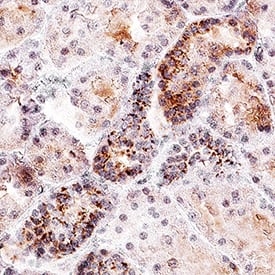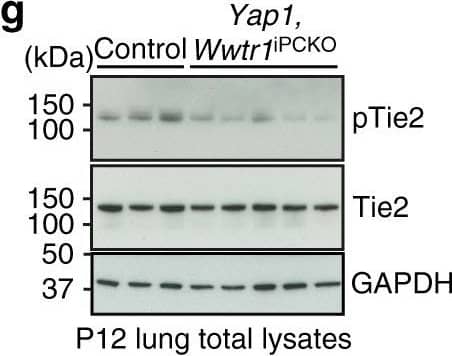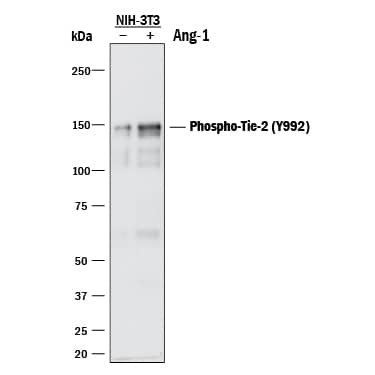Human/Mouse Phospho-Tie-2 (Y992) Antibody
R&D Systems, part of Bio-Techne | Catalog # AF2720

Key Product Details
Validated by
Biological Validation
Species Reactivity
Validated:
Human, Mouse
Cited:
Human, Mouse
Applications
Validated:
CyTOF-ready, Immunohistochemistry, Intracellular Staining by Flow Cytometry, Western Blot
Cited:
FACS, Immunocytochemistry, Immunohistochemistry, Western Blot
Label
Unconjugated
Antibody Source
Polyclonal Rabbit IgG
Product Specifications
Immunogen
Phosphopeptide containing human Tie-2 Y992 site
Specificity
Detects human and mouse Tie-2 when phosphorylated at Y992 in Western blots.
Clonality
Polyclonal
Host
Rabbit
Isotype
IgG
Scientific Data Images for Human/Mouse Phospho-Tie-2 (Y992) Antibody
Detection of Mouse Phospho-Tie‑2 (Y992) by Western Blot.
Western blot shows lysates of NIH-3T3 mouse embryonic fibroblast cell line transfected with mouse Tie-2 and untreated (-) or treated (+) with 600 ng/mL Recombinant Human Angiopoietin-1 (Catalog # 923-AN) for 5 minutes. PVDF membrane was probed with 0.5 µg/mL of Rabbit Anti-Human/Mouse Phospho-Tie-2 (Y992) Antigen Affinity-purified Polyclonal Antibody (Catalog # AF2720) followed by HRP-conjugated Anti-Rabbit IgG Secondary Antibody (Catalog # HAF008). A specific band was detected for Phospho-Tie-2 (Y992) at approximately 150 kDa (as indicated). This experiment was conducted under reducing conditions and using Immunoblot Buffer Group 1.Phospho-Tie-2 (Y992) in Human Kidney Tissue.
Tie-2 was detected in immersion fixed paraffin-embedded sections of human kidney tissue using Rabbit Anti-Human/Mouse Phospho-Tie-2 (Y992) Antigen Affinity-purified Polyclonal Antibody (Catalog # AF2720) at 1 µg/mL overnight at 4 °C. Before incubation with the primary antibody, tissue was subjected to heat-induced epitope retrieval using Antigen Retrieval Reagent-Basic (Catalog # CTS013). Tissue was stained using the Anti-Rabbit IgG VisUCyte™ HRP Polymer Antibody (brown; Catalog # VC003) and counterstained with hematoxylin (blue). Specific staining was localized to cytoplasm in convoluted tubules. View our protocol for IHC Staining with VisUCyte HRP Polymer Detection Reagents.Detection of Tie-2 in HUVEC Human Cells by Flow Cytometry.
HUVEC human umbilical vein endothelial cells were unstimulated (light orange filled histogram) or treated with 100 µM pervanadate for 15 minutes (dark orange filled histogram), then stained with Human/Mouse Phospho- Tie-2 (Y992) Antigen Affinity-purified Polyclonal Antibody (Catalog # AF2720) or control antibody (Catalog # AB-105-C, open histogram), followed by Phycoerythrin-conjugated Anti-Rabbit IgG Secondary Antibody (Catalog # F0110). To facilitate intracellular staining, cells were fixed with paraformaldehyde and permeabilized with methanol.Applications for Human/Mouse Phospho-Tie-2 (Y992) Antibody
Application
Recommended Usage
CyTOF-ready
Ready to be labeled using established conjugation methods. No BSA or other carrier proteins that could interfere with conjugation.
Immunohistochemistry
1-15 µg/mL
Sample: Immersion fixed paraffin-embedded sections of human kidney tissue
Sample: Immersion fixed paraffin-embedded sections of human kidney tissue
Intracellular Staining by Flow Cytometry
0.25 µg/106 cells
Sample: HUVEC human umbilical vein endothelial cells treated with pervanadate, fixed with paraformaldehyde, and permeabilized with methanol
Sample: HUVEC human umbilical vein endothelial cells treated with pervanadate, fixed with paraformaldehyde, and permeabilized with methanol
Western Blot
0.5 µg/mL
Sample: NIH‑3T3 mouse embryonic fibroblast cell line transfected with mouse Tie-2 and treated Recombinant Human Angiopoietin‑1 (Catalog # 923-AN)
Sample: NIH‑3T3 mouse embryonic fibroblast cell line transfected with mouse Tie-2 and treated Recombinant Human Angiopoietin‑1 (Catalog # 923-AN)
Reviewed Applications
Read 2 reviews rated 3 using AF2720 in the following applications:
Formulation, Preparation, and Storage
Purification
Antigen Affinity-purified
Reconstitution
Reconstitute at 0.2 mg/mL in sterile PBS. For liquid material, refer to CoA for concentration.
Formulation
Lyophilized from a 0.2 μm filtered solution in PBS with Trehalose. *Small pack size (SP) is supplied either lyophilized or as a 0.2 µm filtered solution in PBS.
Shipping
Lyophilized product is shipped at ambient temperature. Liquid small pack size (-SP) is shipped with polar packs. Upon receipt, store immediately at the temperature recommended below.
Stability & Storage
Use a manual defrost freezer and avoid repeated freeze-thaw cycles.
- 12 months from date of receipt, -20 to -70 °C as supplied.
- 1 month, 2 to 8 °C under sterile conditions after reconstitution.
- 6 months, -20 to -70 °C under sterile conditions after reconstitution.
Background: Tie-2
Tie-2 (also known as TEK) is an angiogenic receptor tyrosine kinase required for the later stage of blood vessel maturation. Ligand binding induces receptor dimerization and autophosphorylation on multiple tyrosine residues. Y992 is located on the putative activation loop of Tie-2 and is a major autophosphorylation site.
Long Name
Tyrosine Kinase with Immunoglobulin and Epidermal Growth Factor Homology Domains 2
Alternate Names
CD202b, TEK, Tie2
Entrez Gene IDs
Gene Symbol
TEK
Additional Tie-2 Products
Product Documents for Human/Mouse Phospho-Tie-2 (Y992) Antibody
Product Specific Notices for Human/Mouse Phospho-Tie-2 (Y992) Antibody
For research use only
